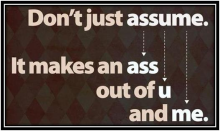from Lars Syll — I will remember that I didn’t make the world, and it doesn’t satisfy my equations. — Though I will use models boldly to estimate value, I will not be overly impressed by mathematics. — I will never sacrifice reality for elegance without explaining why I have done so. — Nor will I give the people who use my model false comfort about its accuracy. Instead, I will make explicit its assumptions and oversights. — I understand that my work may have enormous effects on society...
Read More »Mainstream economics — a form of brain damage
from Lars Syll [embedded content] It is difficult to understand why mainstream economists keep on using their unreal and irrelevant models! Sure, you get academic accolades and give the impression of having something deep and ‘scientific’ to say, but that should count for nothing if you’re in the truth business. As long as that kind of modelling output doesn’t come with the accompanying warning text “NB! This is model-based results based on tons of more or less unsubstantiated...
Read More »We need our Hutton
from Peter Radford – the question is how does economics get its much needed revamp? This caught my eye: “Debreu noted in his Nobel Prize lecture that the success of the mathematization of economic theory depended “on the fact that the commodity space has the structure of a real vector space”. We have shown that this is incorrect. The “price vector” is not a vector, and GET [General Equilibrium Theory] is therefore false. But we may go further and assert that not only was the...
Read More »Statistical models and the assumptions on which they build
from Lars Syll Every method of statistical inference depends on a complex web of assumptions about how data were collected and analyzed, and how the analysis results were selected for presentation. The full set of assumptions is embodied in a statistical model that underpins the method … Many problems arise however because this statistical model often incorporates unrealistic or at best unjustified assumptions … The difficulty of understanding and assessing underlying assumptions is...
Read More »The market did not cause inequality, no matter how much the New York Times insists
from Dean Baker It is a complete article of faith in intellectual circles that the market is responsible for the rise in inequality that we have seen in the United States and elsewhere over the last half-century. Intellectual types literally cannot even consider the alternative that inequality was the result of government policies, not the natural workings of the market. The standard line is that technology and globalization were responsible for the increasing gap in income between people...
Read More »The price of economics
from Peter Radford Thank you Mariano Torras. You said the following in a letter to the Financial Times: “I would venture that there is a professional motive for perpetuating — through the use of elegant and abstract models — the fantasy that economics is a science. The prestige, the stature and influence that such a myth permits is undeniable. Yet, far more perniciously, the ostensible neutrality of “economic science” provides seemingly unshakeable ideological cover against critics who...
Read More »Liz Truss. Or: how not to pay for the war
The Dutch September HICP inflation rate was 17,1%. One year ago it was 3,0%. Below, I will argue that this is a sign of kind of war economy, not of a cyclically overheated economy. Ways to mitigate inflation were pioneered by the English economist John Maynard Keynes in his ‘How to pay for the war‘. it’s useful to go back to his ideas. The first version was published in three parts in The Times of november 1939. It was partly based on his experiences in World War I and partly on the...
Read More »Uncertainty
from Lars Syll It may be argued … that the betting quotient and credibility are substitutable in the same sense in which two commodities are: less bread but more meat may leave the consumer as well off as before. If this were, then clearly expectation could be reduced to a unidimensional concept … However, the substitutability of consumers’ goods rests upon the tacit assumption that all commodities contain something — called utility — in a greater or less degree; substitutability is...
Read More »new issue of real-world economic review
real-world economic review issue no. 101 – September 2022download whole issue Two conceptions of the nature of money Tony Lawson 2 How power shapes our thoughtsAsad Zaman 20 SARS-CoV-2: The Neoliberal VirusImad A. Moosa 27 The giant blunder at the heart of General Equilibrium TheoryPhilip George 38 A life in development economics and political economy: An interview with Jayati GhoshJayati Ghosh and Jamie Morgan 44 John Komlos and the...
Read More »China is the world’s largest economy: Get over it
from Dean Baker It is common for politicians and pundit types to speculate on when or whether China’s economy will pass the US economy as the world’s largest. The latest episode to cross my path was a column by David Wallace in the New York Times. There is little reason for this sort of speculation. China is already the world’s largest economy, its economy is more than 20 percent larger than the US economy, according to the IMF. Furthermore, it is growing considerably more rapidly...
Read More » Real-World Economics Review
Real-World Economics Review





